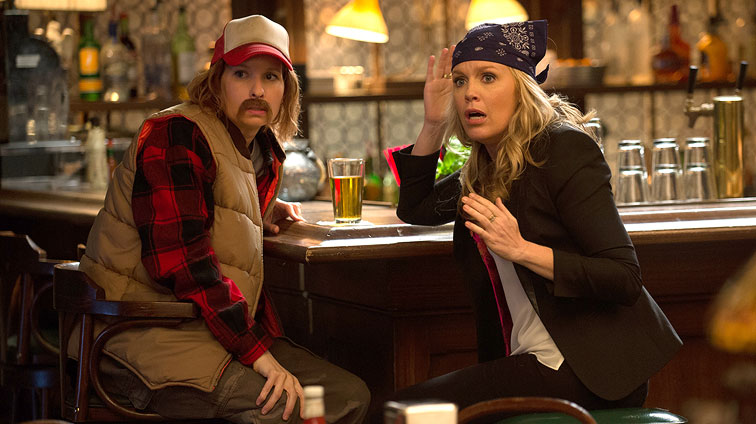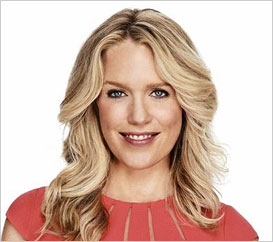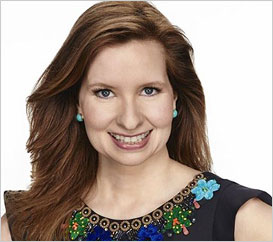
Two Ladies and a Baby
Jessica St. Clair & Lennon Parham, creators/stars of the new baby-raising series Playing House, offer their insights on the recent shift in women-driven comedy and what they really think about breast pumps in the writers’ room.
 USA Networks
Jessica St. Clair
USA Networks
Jessica St. Clair
 USA Networks
Lennon Parham
USA Networks
Lennon Parham
We went through a period where girls were portrayed as the bitch, the slut and the nerd — but there are no girls that are that one thing. We're all bitchy slutty nerds in our own way.
— Jessica St. ClairAny guy who claims “chicks aren’t funny” hasn’t spent time with Jessica St. Clair and Lennon Parham, nor has he seen their new USA Network single-camera comedy Playing House.
In fact, it’s hard to have a serious conversation with them. From their announcement that they were conducting the phone interview while eating Korean food in Lennon’s nursery which smelled of feet, to Jessica’s attempt to fix me up with a member of her writing staff (which has been deftly edited from the Q&A below) to Lennon’s rant that men should consider human breast milk a “sweet treat” (again with the editing), these women have no problem cracking people up.
Of course, this should come as no surprise, given their pedigree. Both are Upright Citizens Brigade alumni, the co-creators of the NBC show Best Friends Forever, and seasoned veterans of the big and small screens. Jessica work includes Enough Said, Bridesmaids, and Veep. Lennon appeared in Confessions of a Shopaholic, Accidently on Purpose, and Parks and Recreation.
Despite the constant jocularity, the ladies managed to offer some real insight into how they create their semi-improvised show, which they describe as being about “two ladies and a baby,” and to discuss the state of women in comedy. But while all this is wildly informative, I would have liked for Jessica to tell me a little more about her friend Vera…
What was the genesis of the project?
Jessica St. Clair: Well, Lennon and I are real life best friends. We met at the UCB—the Upright Citizens Brigade Theater—a million years ago.
Lennon Parham: We'd written a couple of things together, this was our third thing we wrote. And basically when we're ready to start brainstorming, we put on some comfy pants, we go to somebody's living room—this time it was mine—and we have like Oprah's favorites that we've saved on DVR.
Jessica St. Clair: You know, Oprah's Favorite Things, we watch like five minutes at a time, we can pretend that it's not been cancelled. We're still not done, by the way.
Lennon Parham: And we both brought to the table a bunch of ideas.
Jessica St. Clair: Right, and we always knew that we wanted to write about female friendship and especially the kind of friendship that's so close that you might as well be in a romantic relationship.
Lennon Parham: We have a front row seat to that relationship, since we're living it.
Jessica St. Clair: So I was like, "Lennon, this is crazy, but what if you and I were to raise a baby?" And she was like, "What? That is amazing, let's do it." To ourselves, we called it Two Ladies and a Baby for a while, which is a terrible title, and that's how we knew it would work. The worse the fake title we give it the better the project is.
So that's a little tip for writers?
Jessica St. Clair: Yeah, a little tip.
Lennon Parham: Maybe just for us, a little tip for us.
Jessica St. Clair: Basically we both had babies on the brain. We were not pregnant, either of us, but that was sort of the next frontier. We always write about what's happening in our real lives. We knew that that was the next adventure we were about to go on, so we thought wouldn't it be interesting if two women went on this adventure? You haven't really seen that.
Lennon Parham: As friends.
Jessica St. Clair: As best friends, not as lesbians. Although we're called “friendsians” a lot. And my husband, when he tweets, refers to me as his wife and Lennon as his other wife, which is so creepy.
Lennon Parham: I find it endearing.
Jessica St. Clair: It freaks me out.
And how do you feel about comparisons to your previous show, Best Friends Forever?
Lennon Parham: We're happy for them because we're really proud of that show. We found a lot of our audience. So the chemistry, the dynamics that you saw in BFF, it's the same because it's us, but it's just a completely different situation.
Jessica St. Clair: We learned a lot of lessons on BFF in terms of how to make things easy for us the next time around. One thing we did was we had a writers’ room that was almost primarily people from our theater, the Upright Citizens Brigade Theater. We basically wrote up a list of all of our favorite people from the UCB, and we just wrote parts with them in mind. So we didn't have to actually cast anything, we already knew every week we would be playing with these best friends.
And what's phenomenal about the people from the UCB is, since they're all improvisers, when they come in they give you 400 endings for a scene.
How much is improv and how much is scripted?
Lennon Parham: Basically we break in the room with our writers and then we go back and comb through it in a really detailed outline. Then Jess and I go with whoever is writing that episode, and we improvise the scenes.
Jessica St. Clair: We act out all the characters.
Lennon Parham: We basically do our draft on our feet. So the first one is a rough draft, we talk about what we liked and then we re-improvise until we've got it pretty tight.
When the cameras are rolling, does the improvisation ever pull up new ideas what inspire you to rework the plot?
Lennon Parham: We don't really shift content within the scene, but we definitely shift the way we say things.
Jessica St. Clair: Even though we've improvised the scene already before it even becomes a script, sometimes we get it on a speech and let's say Jason Mantzoukas is playing a guest star role and what we improvise for him doesn't sound natural coming out of his mouth, we'll ask him to make it his own, but it doesn't change the plot.
Given the way you and your friends improvise so much, your show would have to be much less micromanaged by the suits than traditional TV.
Lennon Parham: Well, at USA we got really lucky. They have a real thing for artists' voices, and they do that with their other shows as well.
Jessica St. Clair: They're very respectful of your process. We got a note that said, "Could you just have more of your voice in it?" We were like, "What?" We're used to being told to tone it down, if anything.
No one likes the term self-censor but how do you self-censor to make sure that it's appropriate for basic cable?
Lennon Parham: They tell us when it's too far, but when we're shooting, we shoot it all, what's funny is funny.
Jessica St. Clair: Lennon and I don't write shock for shock’s sake. Yes, in the pilot her husband does get caught putting stuff up his butt online, but that's not because it was the specifics of putting something up your butt, it was more that we wanted him to be having this online relationship with a foreign person, and we just thought…
Lennon Parham: This'll be funny.
Jessica St. Clair: But we're not trying to push the boundaries that way. We want people to recognize themselves and their friendships in what we write. When people do cheat on each other a lot of weird stuff comes out, you know?
How do you go about balancing character with farce?
Lennon Parham: We always try to tell a true story. I mean it might be heightened for television but one of the key elements of improv at the Upright Citizens Brigade is no matter what the situation is, whether you're like turning into panthers on the moon or whatever, you want to do that to the top of your intelligence and as accurately as this character would react, were they to be in this situation. So hopefully it all feels very authentic, like we're really reacting the way that we would in these heightened situations that we're putting ourselves in.
Jessica St. Clair: And that being said, we also watched a lot of old Laverne & Shirley before we started writing. Tell you what: those episodes are insane. Like there's an episode where they enroll themselves in a medical testing situation.
Lennon Parham: Yeah, and one of them is sleep deprived and one of them is not fed, so when they get to the party one of them can't stop eating and one of them keeps falling asleep.
Jessica St. Clair: So it's like they're very simple concepts, and it's really fun to watch them go on these adventures. Whatever we're doing in these episodes it's always fun to watch these girls get out of this awkward situation.
Speaking of Laverne & Shirley, it seems that female-driven broad comedy is getting traction lately. Have you guys noticed that in your careers?
Lennon Parham: Definitely.
Jessica St. Clair: Bridesmaids really opened up a lot of doors for a lot of us. Women have always been funny, it's just that it was a little bit harder. Now people are just like, “Oh, funny is funny.” So in that sense we're not writing girl comedy.
Lennon Parham: But it's clearly our voice, so in that sense it is girl comedy but it isn't, because it's just straight comedy.
Jessica St. Clair: And guess what? Our hair looks phenomenal while we're doing it.
Why has this shift taken so long?
Jessica St. Clair: I don't know because there was Laverne & Shirley, Lucy and Ethel, Kate & Allie, The Golden Girls—that was the golden age of television, but then we went away from that, and I don't know why that happened, but I feel like another renaissance is happening now. It's awesome to be a part of it. We went through a period where girls were portrayed as the bitch, the slut and the nerd—but there are no girls that are that one thing. We're all bitchy slutty nerds in our own way and those girls wouldn't be friends. So what's really nice is Bridesmaids showed us what real girl friendship is like.
What's also really nice is all girl comedians are pretty much supportive of each other. You would think it would be a competition, but we don't feel that way at all. If Lena Dunham is successful that's a win for all of us. Amy Poehler was always pulling young girl comedians up with her.
But is that only women? Are men bastards, meanwhile?
Jessica St. Clair: No, here's the thing. The guys that we know at the UCB are the nicest dudes in the world and all they want to do is help. While we were in the writers’ room, we had our breast pumps going, both of us, while we were giving them notes, and they were like completely okay with it.
Or they enjoyed it, you don't know.
Jessica St. Clair: They didn't, trust me.
Lennon Parham: Nobody enjoys that.
Jessica St. Clair: Nobody enjoys it.
© 2014 Writers Guild of America West
